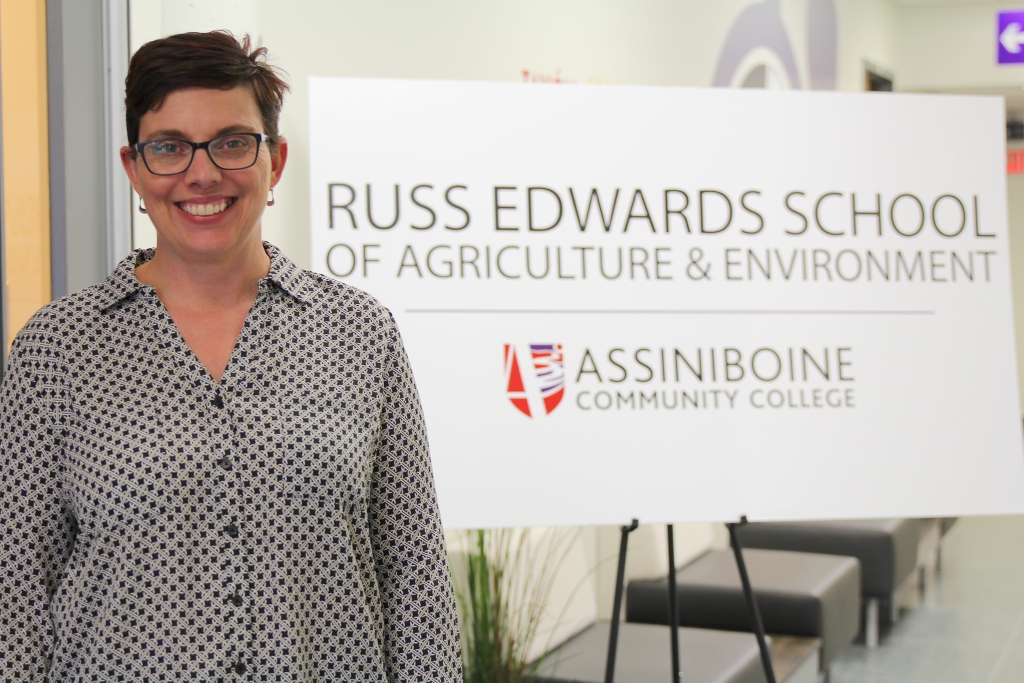
Assiniboine Community College is introducing a swine production foundations program, with the first student to start in December.
The online and self-directed program provides learners with an understanding of swine operations, including regulations, health and safety, record keeping, and barn systems and maintenance. It will also cover content on production practices related to stockmanship, pig health care, breeding, farrowing, nursery, and grow and finish.
Angela Pearen, the coordinator of agriculture extension of the newly-named Russ Edwards School of Agriculture and Environment at the Assiniboine Community College said this first foundation program is for swine technicians. It gives them foundational training in three areas, swine operations, production practices, and professionalism.
“These are folks starting, working in hog barns as swine technicians giving them those skills to learn how the barns work, the regulations, health and safety, biosecurity, those types of things.”
Pearen said next getting into production practices like farrowing, breeding, and gestation. Then, in the professionalism part, the student learns skills as a team member. And so communication skills, conflict resolution, working as part of a team, working in a diverse workplace, things called soft skills, but these are the hard ones and can make or break a workplace.
ACC took a program offered to Manitoba Pork a long time ago, an apprenticeship program and MP requested, “Hey, can we change this up and look at how we can make it more relevant to today’s workplace?” The first participant starts on December 1.
ACC gives full online delivery and extremely interactive books with different activities where the students will self-assess their learning. At each module’s end they complete a quiz or an assignment which ties back to their work in their workplace.
In response, Dr. John Carr an international pig veterinarian says, “We need to have professionals on the farm looking after these pigs, not just a labourer who has no interest other than having a job and paycheque.”
Replacing those people with professionals that, number one, want to be there, number two, know what they’re doing, and number three, have the pigs’ best interest at heart.
Pearen said that is why MB Pork said, “Hey, we need a program.”
Every student that completes the three courses has five years to complete and receive a document of achievement from the ACC in swine production foundations. And a little bit of a carrot, they get to attend graduation. So it elevates that position and encourages the students to say, “Hey, I’ve got a college document of achievement in this.”
Suppose they continue with the second and third courses still in the building stages with the launch date in the spring of 2023. The following program is advanced swine production focused on those who have already been swine technicians for some time. Those with good supervision skills take the next course in some supervisory capacity and go into more detail in that advanced production practices.
The final course deals with leadership in swine production for workers making management decisions.
“This is about breeding stock and higher-level HR issues some hiring and firing. The program builds upon these foundations. If some folks are ready to move on to the next level, they do the advanced course going into management.
For most students of these courses, the next step is getting a job, or it can be workers already employed.
Independent producers without a formal training program are interested in hiring someone or an existing staff member. Having them enroll in the online course makes it more flexible for someone already working.
The employer can say, “Hey, you complete, we’ll reimburse you.” So, they may pay for it right up front. And they can take the course in the evenings.
Or the employer may say, “Hey, you get two days, two hours, or X number of hours a week to work on your course.” It’s very flexible. The course will start the first of every month, and then depending on the credit hours; they have up anywhere from four to eight months to complete the course. •
— By Harry Siemens





